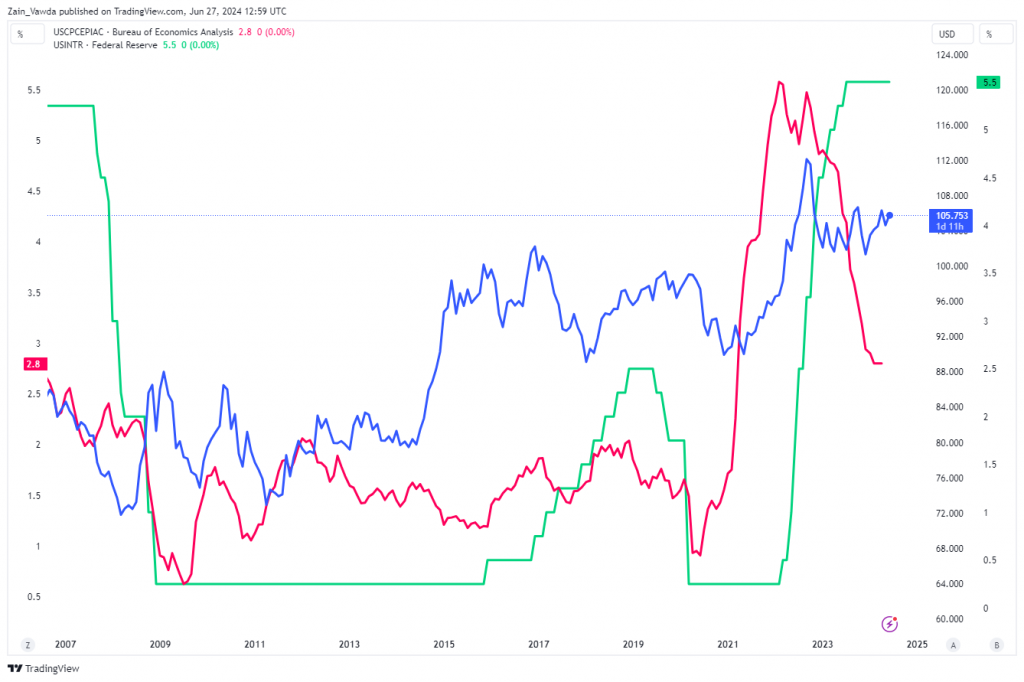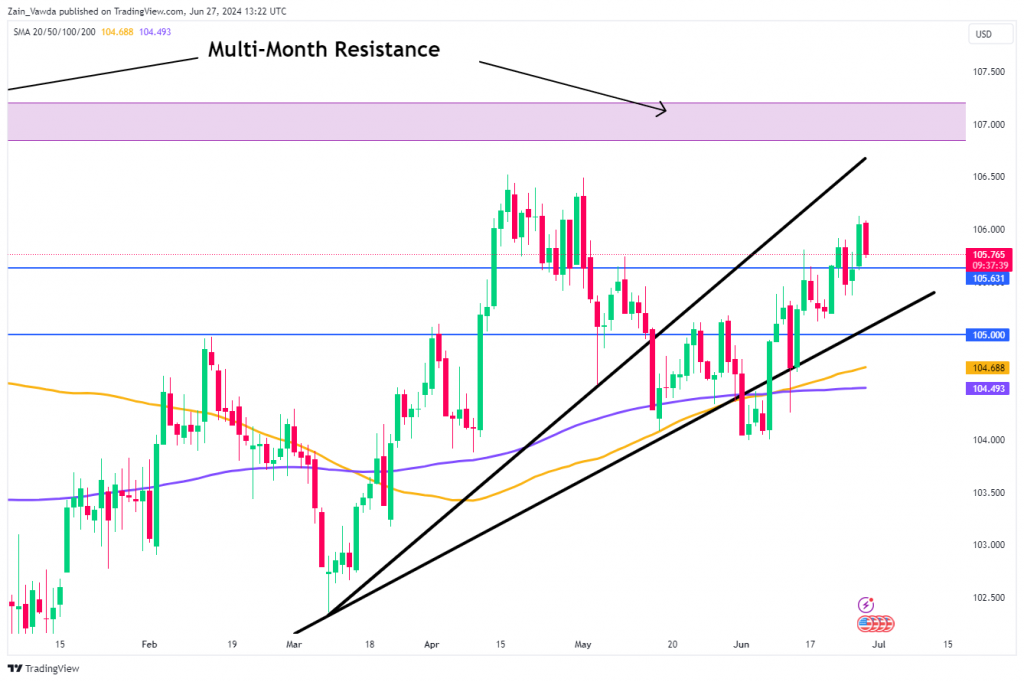- What is the US PCE data and why is it important?
- Uncertainty regarding the Federal Reserve and US Dollar remains high due to conflicting US data and global inflation concerns.
- The upcoming PCE data release is highly anticipated as it may influence the Fed’s stance on rate cuts.
- The US Dollar Index (DXY) is rangebound ahead of the PCE release. Will 107 finally be revisited?
Most Read: Bitcoin (BTC/USD) Stabilizes: Is this the bottom markets have been waiting for?
Market participants continue to wrestle with uncertainty regarding the Federal Reserve and the US Dollar. The recent rise in inflation in Australia and Canada serves as a stark reminder that the fight against inflation may not be over. Over the past month, US data has been both divisive and inconclusive, splitting opinions into two camps: those advocating for immediate rate cuts and those who support the Fed’s cautious stance.
A recent lull in high impact US data has only seen anticipation grow ahead of this week’s PCE data release. This is after all considered by many the Fed’s preferred inflation gauge with the hope that it will deliver enough for the Fed to switch to a more decisive tone. It is important to note that US inflation numbers do appear to be on the right path but as policymakers have reiterated, the homestretch is always the toughest.
There is no doubting the importance of the PCE data for the US economy and Fed policymakers in particular. The question is why and I hope this sheds some light on the topic.
US PCE Data and Its Importance
The Personal Consumption Expenditures (PCE) Price Index serves as a measure of the average increase in prices for all domestic personal consumption. Unlike the Consumer Price Index (CPI), which only considers out-of-pocket expenditures, the PCE Price Index includes all expenditures, regardless of who pays for them. This encompasses spending by consumers, employers, and government programs like Medicare and Medicaid. This broader scope provides a more comprehensive view of inflationary pressures in the economy.
The reason many consider it the Fed’s preferred inflation gauge is complex. Unlike the CPI it is a much less volatile index. There are many other reasons such as the flexible weighting and comprehensive coverage while not forgetting healthcare costs which are a big part of the US economy as well. Thus it is the Core PCE number that is frequently highlighted in economic analyses to understand long-term inflation trends without the noise from the more volatile food and energy sectors. As with most things markets (whether right or wrong) related, a longer term view is always perceived as more reliable.
Looking at the relationship between the US Dollar and the PCE data is definitely a worthwhile exercise. The PCE index is seen as a good predictor as to the path of both monetary policy and the US Dollar. Look at the chart below which compares the USD Index (blue line), Core PCE number (red line) and the US Interest rate (green line).
2021 serves as a perfect example. Core PCE or the red line begins to rise at the back end of 2020 and accelerates into 2021. This sees the likelihood of interest rate hikes increase and thus the US Dollar index begins to strengthen and rises as well.
Comparison Chart- US Dollar Index (DXY) vs US Interest Rate vs US PCE Index, June 27, 2024
Source: TradingView.com (click to enlarge)
Impact on the US Dollar and Fed Policy
Looking at the chart above and the current climate, it is obvious why market participants are expecting rate cuts to materialize soon. The PCE number has been on a sharp decline since early 2023 but does seem to have plateaued of late which is likely the reason for growing uncertainty from market participants as it remains above the Feds targeted 2% mark.
If US PCE data continues to decline, market participants are likely to adjust their expectations for rate cuts. This could theoretically weaken the US Dollar. Conversely, an increase in the PCE number is likely to strengthen the Dollar. Market consensus for tomorrows release sees both the CORE and headline number at 2.6%.
Of course there is another big event happening this evening and that is the debate between US President Joe Biden and former President Donald Trump. This may be the first glimpse of what market participants can expect from the US Dollar when the US elections come around later in the year. A victory in the debate for Trump should strengthen the US Dollar as Trump is seen as more favorable to the US Dollar at this stage. The question is with uncertainty around monetary policy, will markets respond as expected?
Lastly, we are at the end of Q2 and that means market participants and fund alike will be repositioning and updating their allocations ahead of a new quarter. This could lead to some unexpected volatility and is worth keeping in mind as the week draws to a close.
Technical Analysis on the US Dollar Index (DXY)
The US Dollar index has been topsy turvy for the longest time as policy uncertainty remains prevalent. The lack of clarity has meant that any breakout attempts or long term directional moves have remained absent in 2024.
Looking at the daily chart below and having broken the interior ascending trendline and the exterior one, the DXY failed to fall further. Instead the DXY printed a strong reversal pushing back up to the 106.00 handle.
The key multi-month resistance level at the 107,00 area continues to hold firm and does not look likely to give way anytime soon. It would require a substantial miss to the downside from tomorrow’s PCE data for the possibility of a sustained break of 107.00 to materialize.
US Dollar Index (DXY) Daily Chart, June 27, 2024
Source: TradingView.com (click to enlarge)
Key Levels to Keep an Eye on;
Support
- 105.63
- 105.00
- 104.50
Resistance
- 106.50
- 107.00
- 108.50
Content is for general information purposes only. It is not investment advice or a solution to buy or sell securities. Opinions are the authors; not necessarily that of OANDA Business Information & Services, Inc. or any of its affiliates, subsidiaries, officers or directors. If you would like to reproduce or redistribute any of the content found on MarketPulse, an award winning forex, commodities and global indices analysis and news site service produced by OANDA Business Information & Services, Inc., please access the RSS feed or contact us at info@marketpulse.com. Visit https://www.marketpulse.com/ to find out more about the beat of the global markets. © 2023 OANDA Business Information & Services Inc.




